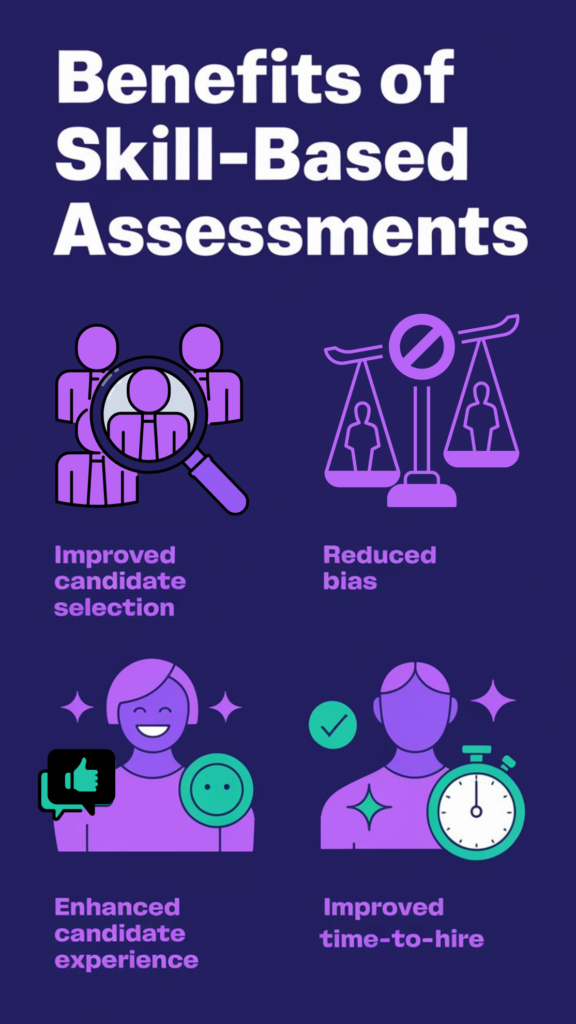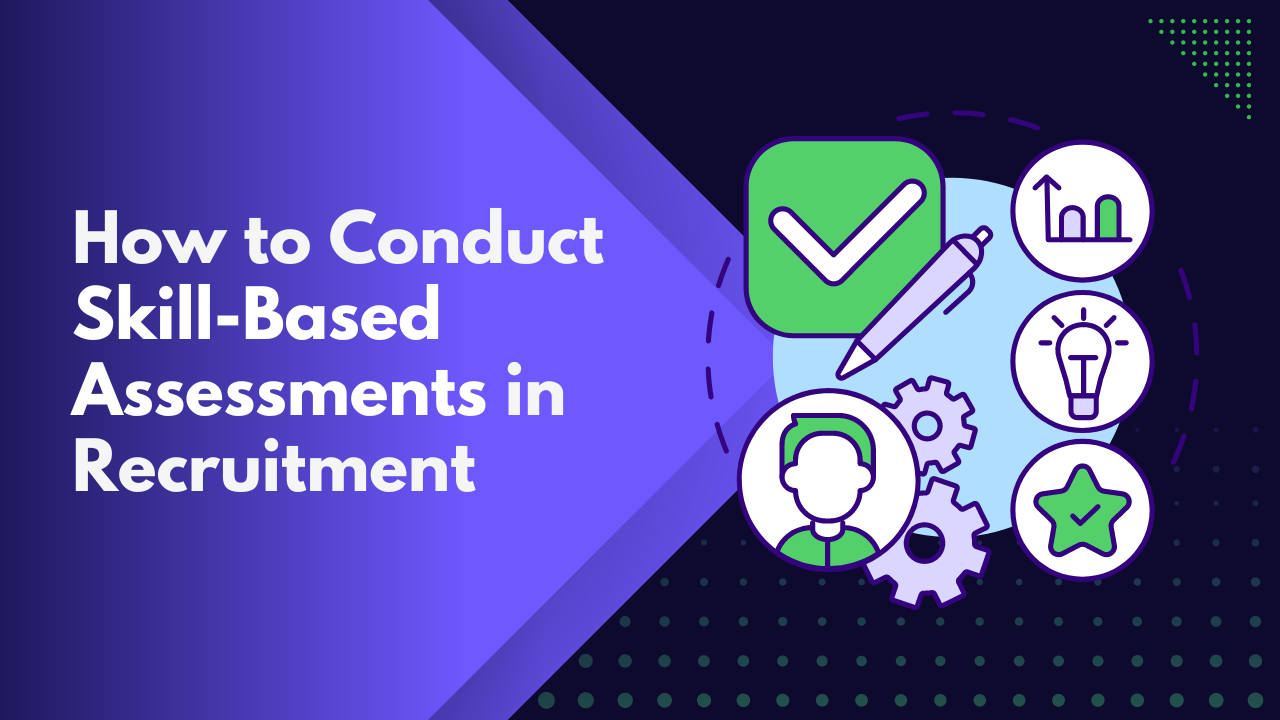Did you know that 85% of HR professionals admit traditional hiring methods often fall short in predicting job performance? Enter skill-based assessments, a game-changer in modern recruitment. These assessments evaluate candidates based on their actual abilities rather than just resumes or interviews, leading to more accurate and fair hiring decisions 1.
In today’s competitive job market, conducting effective skill-based assessments can be the key to finding the right talent for your organization. This blog post will guide you through the process of implementing skill-based assessments in your recruitment strategy. We’ll explore the benefits of this approach, including improved candidate selection, reduced bias, and enhanced ROI 3. We’ll also dive into various types of assessments, best practices for implementation, and how to overcome potential challenges.
Whether you’re new to skill-based hiring or looking to refine your current process, this comprehensive guide will equip you with the knowledge and tools to revolutionize your recruitment efforts. Let’s dive in and discover how skill-based assessments can transform your hiring process and help you build a more talented, diverse, and effective workforce.
The Power of Skill-Based Assessments: Transforming Your Recruitment Process

Skill-based assessments are revolutionizing the way companies hire, offering a more accurate and fair approach to evaluating candidates. Let’s explore the numerous benefits that make these assessments a game-changer in modern recruitment.
1. Improved Candidate Selection
One of the most significant advantages of skill-based assessments is their ability to enhance the quality of candidate selection. Traditional hiring methods often rely heavily on resumes and interviews, which can be subjective and may not accurately reflect a candidate’s true capabilities. In contrast, skill-based assessments provide objective data on a candidate’s actual abilities, leading to more informed hiring decisions 3.
For example, a software development company implementing coding tests as part of their recruitment process can directly evaluate a candidate’s programming skills, problem-solving abilities, and code quality. This approach ensures that the selected candidates have the necessary technical skills to excel in their roles.
2. Reduced Bias and Increased Diversit
Skill-based assessments play a crucial role in promoting diversity and inclusion in the workplace. By focusing on a candidate’s abilities rather than their background or qualifications, these assessments help mitigate unconscious biases that can creep into traditional hiring processes. This shift leads to a more diverse workforce, which has been shown to drive innovation and improve business outcomes 2.
A study by Deloitte found that organizations using skill-based hiring practices were 63% more likely to achieve their diversity goals compared to those relying on traditional methods 2.
3. Enhanced Candidate Experience
Skill-based assessments can significantly improve the overall candidate experience. These assessments provide candidates with an opportunity to showcase their abilities and potential, rather than being judged solely on their past experiences or qualifications. This approach is particularly beneficial for career changers or those with non-traditional backgrounds, as it allows them to demonstrate their skills regardless of their previous roles 5.
Moreover, candidates often appreciate the fairness and transparency of skill-based assessments, leading to a more positive perception of the company’s hiring process.
4. Improved Time-to-Hire
Implementing skill-based assessments can streamline the recruitment process, reducing the time-to-hire. By quickly identifying candidates with the required skills, recruiters can focus their efforts on the most promising applicants, eliminating the need for multiple rounds of interviews or lengthy screening processes 1.
For instance, using pre-employment assessments can help filter out unqualified candidates early in the process, allowing recruiters to devote more time to evaluating top-tier candidates.
5. Better Return on Investment (ROI)
Skill-based assessments contribute to a better ROI in the hiring process by:
-
- Reducing turnover rates: By ensuring a better fit between candidates’ skills and job requirements, companies can decrease the likelihood of early resignations or terminations.
-
- Improving productivity: Hiring candidates with the right skills leads to faster onboarding and improved performance.
-
- Decreasing training costs: When employees possess the necessary skills from the start, companies can reduce the need for extensive training programs 12.
A study by the Society for Human Resource Management (SHRM) found that the average cost-per-hire is $4,129. By implementing skill-based assessments and improving hiring accuracy, companies can significantly reduce this cost over time.
As we’ve seen, skill-based assessments offer numerous benefits that can transform your recruitment process, leading to better hires, increased diversity, and improved business outcomes. But how do you choose the right type of assessment for your organization? In the next section, we’ll explore various types of skill-based assessments and how to select the most appropriate ones for your hiring needs.
Types of Skill-Based Assessments: Choosing the Right Tools for Your Hiring Needs
Now that we’ve explored the benefits of skill-based assessments, let’s dive into the various types available and how to choose the right ones for your organization. Like a master chef selecting the perfect ingredients for a gourmet dish, recruiters must carefully choose the assessments that will best evaluate candidates’ abilities and potential.
1. Hard Skills Assessments
These assessments focus on evaluating technical or job-specific skills. For example:
-
- Coding tests for software developers
-
- Writing samples for content creators
-
- Financial modeling exercises for analysts
Hard skills assessments provide concrete evidence of a candidate’s ability to perform specific tasks crucial to the role. They’re particularly effective in fields where technical expertise is paramount.
2. Soft Skills Assessments
Soft skills are increasingly important in today’s collaborative work environments. These assessments evaluate traits like:
-
- Communication
-
- Leadership
-
- Teamwork
-
- Adaptability
Methods for assessing soft skills include situational judgment tests, role-playing exercises, and behavioral interviews. These assessments help predict how well a candidate will fit into your company culture and work with others 8.
3. Cognitive Ability Assessments
These tests measure a candidate’s mental capabilities, such as:
-
- Problem-solving
-
- Critical thinking
-
- Learning ability
Cognitive assessments are excellent predictors of job performance across various roles. They help identify candidates who can quickly adapt to new challenges and learn on the job.
4. Situational Judgment Tests (SJTs)
SJTs present candidates with realistic work scenarios and ask them to choose the most appropriate response. These tests are particularly useful for assessing decision-making skills and how candidates might handle real-world job situations.
5. Portfolio Reviews
For creative or project-based roles, portfolio reviews offer a comprehensive look at a candidate’s past work and capabilities. This method is particularly effective for positions in design, writing, or software development.
Choosing the Right Assessment
Selecting the most appropriate skill-based assessment is crucial for effective hiring. Here are some factors to consider:
Job Requirements: Align your assessments with the specific skills needed for the role.
Company Culture: Choose assessments that also evaluate cultural fit.
Time and Resources: Consider the time and cost involved in administering and evaluating different types of assessments.
Candidate Experience: Opt for assessments that provide a positive and engaging experience for applicants 5.
Pro Tip: Combine multiple assessment types for a more comprehensive evaluation. For instance, pair a hard skills test with a soft skills assessment to get a well-rounded view of a candidate’s abilities.
It’s important to note that while skill-based assessments are powerful tools, they should be used as part of a holistic hiring process. Think of them as pieces of a puzzle – when combined with interviews, reference checks, and other evaluation methods, they create a complete picture of a candidate’s potential.
As you consider implementing these assessments, you might wonder about the logistics of developing and administering them effectively. In the next section, we’ll explore best practices for implementing skill-based assessments in your recruitment process, ensuring you make the most of these valuable tools.
Best Practices for Implementing Skill-Based Assessments in Your Recruitment Process
Now that we’ve explored the types of skill-based assessments, let’s dive into the best practices for implementing them effectively. Think of this process as building a well-oiled machine – each component must work seamlessly together to produce optimal results.
1. Define Key Skills
Start by clearly defining the critical skills required for each role. Collaborate with hiring managers and team leaders to create a comprehensive skill profile. This step ensures that your assessments are tailored to evaluate the most relevant abilities 3.
Pro tip: Regularly review and update these skill profiles to keep pace with evolving job requirements and industry trends.
2. Develop a Structured Process
Create a standardized, structured process for administering skill-based assessments. This approach ensures consistency and fairness across all candidates. Your process might include:
-
- Pre-screening assessments to filter candidates
-
- Role-specific skill tests
-
- Situational judgment tests
-
- Follow-up interviews to discuss assessment results
Remember, consistency is key to making accurate comparisons between candidates.
3. Ensure Validity and Reliability
Your assessments must be both valid (measuring what they’re intended to measure) and reliable (producing consistent results). Consider partnering with industrial-organizational psychologists or assessment experts to develop or validate your tests. Regular evaluation and refinement of your assessments will help maintain their effectiveness 8.
4. Train Interviewers
Equip your hiring team with the skills to effectively administer and interpret skill-based assessments. This training should cover:
- Understanding assessment objectives
- Interpreting results objectively
- Conducting follow-up discussions based on assessment outcomes
Well-trained interviewers can maximize the value of skill-based assessments in the hiring process 4.
5. Leverage Technology
Embrace technology to streamline your assessment process. Platforms like taptalent.ai can automate test administration, scoring, and result analysis, saving time and reducing human error. These tools can also provide valuable insights through data analytics, helping you continually refine your hiring process.
6. Maintain Transparency
Be open with candidates about the assessment process. Explain why you’re using skill-based assessments and how they relate to the role. This transparency not only improves the candidate experience but also allows applicants to showcase their best abilities.
7. Analyze and Improve
Treat your skill-based assessment process as a living entity that requires ongoing care and attention. Regularly analyze the effectiveness of your assessments by:
-
- Tracking the performance of hired candidates
-
- Gathering feedback from hiring managers and candidates
-
- Monitoring industry trends and best practices
-
- Use these insights to continually refine and improve your assessment strategy.
Implementing these best practices will help you create a robust skill-based assessment process. However, like any significant change, this approach may come with challenges. You might wonder about the costs involved, how to prepare candidates fairly, or how to balance skills assessment with traditional experience requirements.
Remember, the goal is to create a hiring process that’s as effective and fair as possible. By focusing on skills, you’re opening doors to talented individuals who might have been overlooked in traditional hiring processes.
As we wrap up our exploration of skill-based assessments, it’s clear that this approach offers tremendous potential for improving recruitment outcomes. In our final section, we’ll address some common challenges and look at the future of skills-based hiring. Get ready to take your recruitment process to the next level!
Navigating Challenges in Skill-Based Assessments: Paving the Way for Success
As we’ve explored the power and implementation of skill-based assessments, it’s crucial to address potential challenges you might face. Like any innovative approach, skill-based hiring comes with its own set of hurdles. However, with the right strategies, these challenges can be transformed into opportunities for growth and improvement.
1. Cost of Development and Implementation
Implementing skill-based assessments can initially seem costly, both in terms of time and resources. However, consider this investment as planting seeds for a bountiful harvest:
-
- Leverage existing resources: Start by adapting assessments from reputable sources or partnering with assessment providers.
-
- Gradual implementation: Begin with key roles and expand gradually to spread costs over time.
-
- Focus on ROI: Remember, improved hiring accuracy leads to reduced turnover and training costs, offsetting initial expenses.
-
- A study by Deloitte found that organizations using skill-based hiring practices were 60% more likely to find high-quality candidates, justifying the initial investment 2.
2. Candidate Preparation and Bias
Ensuring fairness in assessments is crucial. To level the playing field:
• Provide clear instructions and practice materials to all candidates. • Use diverse question types to accommodate different learning styles. • Regularly review and update assessments to prevent bias.
3. Maintaining Confidentiality and Security
Protecting the integrity of your assessments is paramount:
-
- Use secure platforms for test administration.
-
- Implement proctoring measures for remote assessments.
-
- Regularly update and rotate assessment questions to prevent sharing.
4. Balancing Skills and Experience
While skills are crucial, experience brings valuable insights. Strike a balance by:
-
- Weighting skills and experience based on role requirements.
-
- Using scenario-based questions that allow candidates to draw from their experience.
-
- Considering a hybrid approach that combines skill assessments with traditional interviews.
Addressing these challenges head-on will strengthen your skill-based hiring process. Remember, the goal is not perfection, but continuous improvement. As you refine your approach, you’ll find that these initial hurdles become stepping stones to a more effective, fair, and efficient recruitment process.
Key Takeaways:
-
- Skill-based assessments significantly improve hiring accuracy and reduce bias.
-
- Choose assessments that align with job requirements and company culture.
-
- Implement best practices like defining key skills, ensuring validity, and leveraging technology.
-
- Address challenges proactively to strengthen your hiring process.
As we look to the future, skill-based assessments are poised to become an integral part of recruitment. The evolving job market demands a focus on capabilities over credentials, and organizations that embrace this shift will have a competitive edge in attracting top talent.
In conclusion, skill-based assessments offer a powerful tool to transform your recruitment process. By focusing on candidates’ actual abilities, you can build a more diverse, talented, and effective workforce. While challenges exist, the benefits far outweigh the initial hurdles. As you embark on this journey, remember that each assessment is an opportunity to refine your process and get closer to finding the perfect fit for your team.
Ready to take your recruitment to the next level? Consider leveraging advanced tools like taptalent.ai to streamline your skill-based hiring process. With the right approach and tools, you’re well on your way to building the dream team your organization deserves.
Content
- The Power of Skill-Based Assessments: Transforming Your Recruitment Process
- Types of Skill-Based Assessments: Choosing the Right Tools for Your Hiring Needs
- Choosing the Right Assessment
- Best Practices for Implementing Skill-Based Assessments in Your Recruitment Process
- Navigating Challenges in Skill-Based Assessments: Paving the Way for Success




